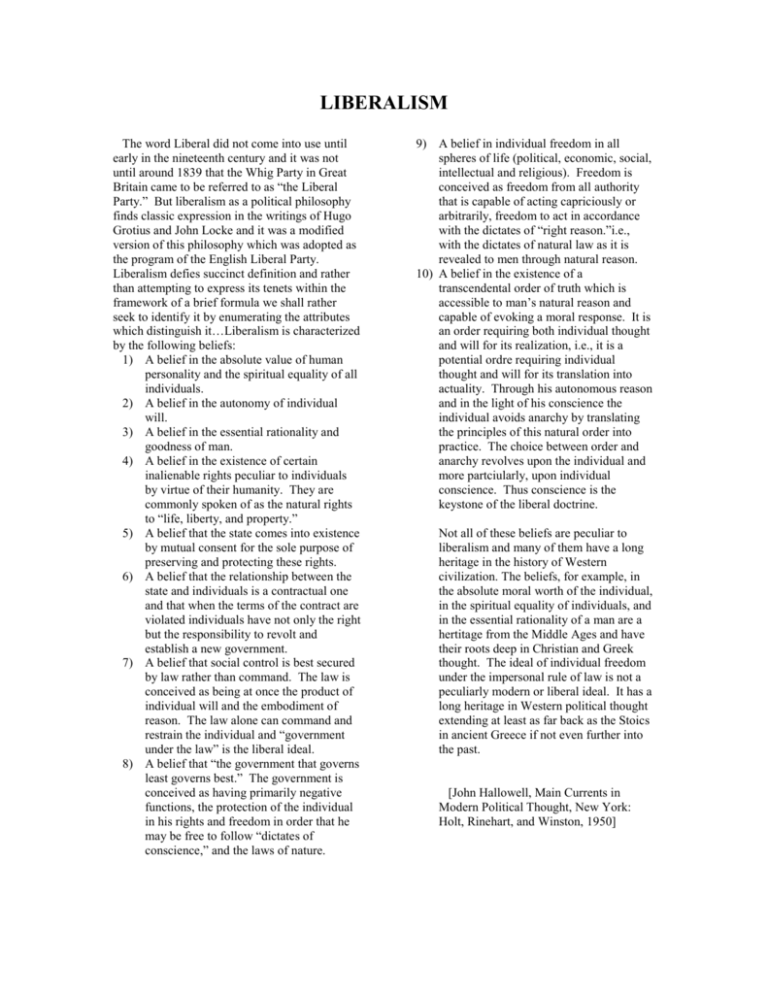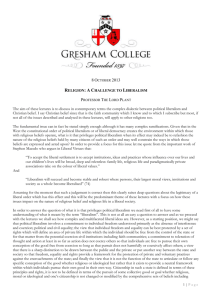LIBERALISM
advertisement

LIBERALISM The word Liberal did not come into use until early in the nineteenth century and it was not until around 1839 that the Whig Party in Great Britain came to be referred to as “the Liberal Party.” But liberalism as a political philosophy finds classic expression in the writings of Hugo Grotius and John Locke and it was a modified version of this philosophy which was adopted as the program of the English Liberal Party. Liberalism defies succinct definition and rather than attempting to express its tenets within the framework of a brief formula we shall rather seek to identify it by enumerating the attributes which distinguish it…Liberalism is characterized by the following beliefs: 1) A belief in the absolute value of human personality and the spiritual equality of all individuals. 2) A belief in the autonomy of individual will. 3) A belief in the essential rationality and goodness of man. 4) A belief in the existence of certain inalienable rights peculiar to individuals by virtue of their humanity. They are commonly spoken of as the natural rights to “life, liberty, and property.” 5) A belief that the state comes into existence by mutual consent for the sole purpose of preserving and protecting these rights. 6) A belief that the relationship between the state and individuals is a contractual one and that when the terms of the contract are violated individuals have not only the right but the responsibility to revolt and establish a new government. 7) A belief that social control is best secured by law rather than command. The law is conceived as being at once the product of individual will and the embodiment of reason. The law alone can command and restrain the individual and “government under the law” is the liberal ideal. 8) A belief that “the government that governs least governs best.” The government is conceived as having primarily negative functions, the protection of the individual in his rights and freedom in order that he may be free to follow “dictates of conscience,” and the laws of nature. 9) A belief in individual freedom in all spheres of life (political, economic, social, intellectual and religious). Freedom is conceived as freedom from all authority that is capable of acting capriciously or arbitrarily, freedom to act in accordance with the dictates of “right reason.”i.e., with the dictates of natural law as it is revealed to men through natural reason. 10) A belief in the existence of a transcendental order of truth which is accessible to man’s natural reason and capable of evoking a moral response. It is an order requiring both individual thought and will for its realization, i.e., it is a potential ordre requiring individual thought and will for its translation into actuality. Through his autonomous reason and in the light of his conscience the individual avoids anarchy by translating the principles of this natural order into practice. The choice between order and anarchy revolves upon the individual and more partciularly, upon individual conscience. Thus conscience is the keystone of the liberal doctrine. Not all of these beliefs are peculiar to liberalism and many of them have a long heritage in the history of Western civilization. The beliefs, for example, in the absolute moral worth of the individual, in the spiritual equality of individuals, and in the essential rationality of a man are a hertitage from the Middle Ages and have their roots deep in Christian and Greek thought. The ideal of individual freedom under the impersonal rule of law is not a peculiarly modern or liberal ideal. It has a long heritage in Western political thought extending at least as far back as the Stoics in ancient Greece if not even further into the past. [John Hallowell, Main Currents in Modern Political Thought, New York: Holt, Rinehart, and Winston, 1950]






